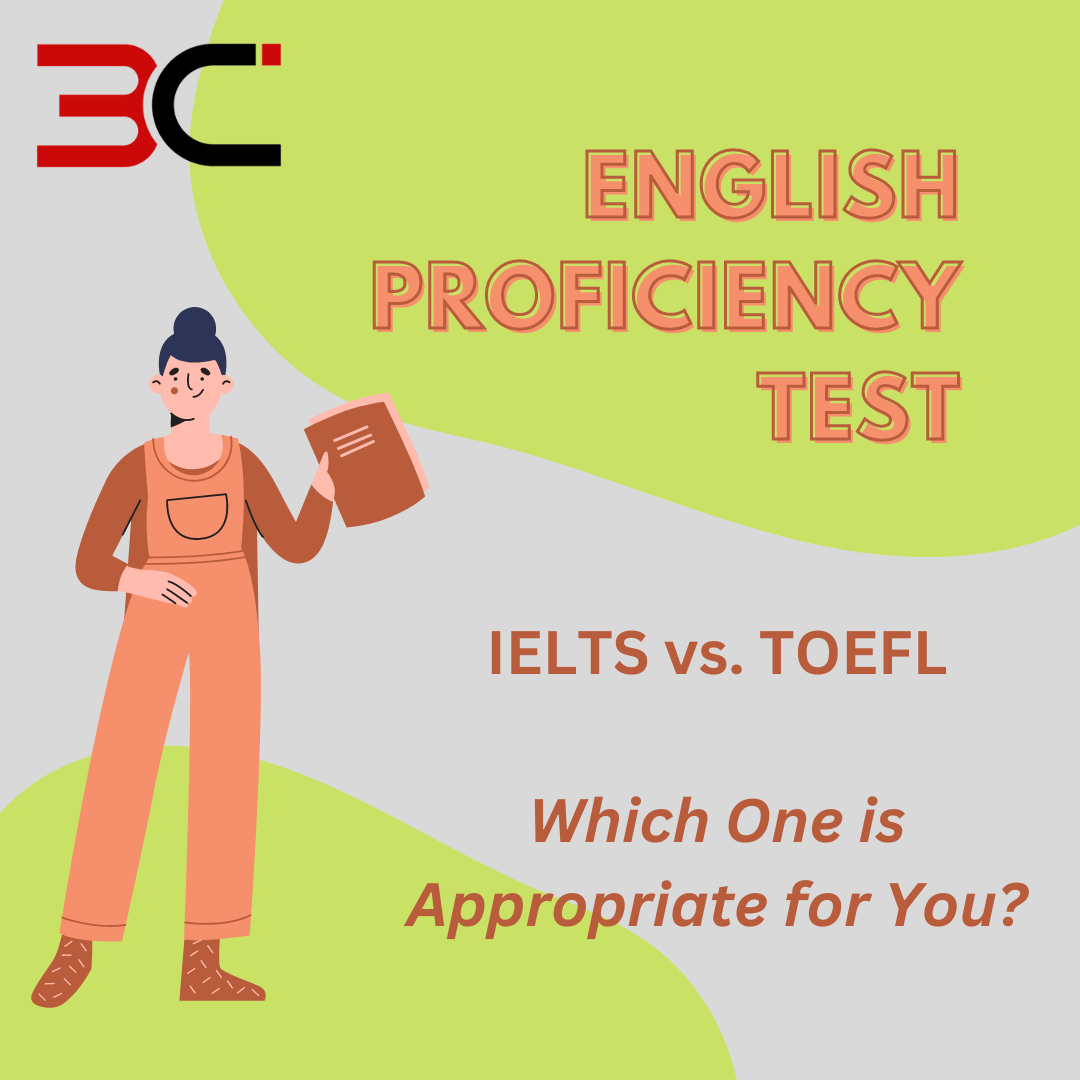Results of the English language proficiency exam are required for overseas students from non-native English-speaking nations applying to colleges abroad.
Two of the most popular and well-recognized exams are IELTS and TOEFL. These exams have a similar objective, yet they differ in a number of ways. So which one is appropriate for you, IELTS or TOEFL?
If you are unsure about this question, read this article to learn how to distinguish between IELTS and TOEFL and make the best decision.
An Overview of TOEFL and IELTS
Although there are plenty of exams to prove your proficiency in English, we will concentrate on IELTS and TOEFL because these are two tests that institutions throughout the world recognize.
Let’s start with a little introduction to these famous English proficiency tests.
What is TOEFL?
The TOEFL, or Test of English as a Foreign Language, is an internationally recognized exam that is accepted at most foreign institutions where English is the medium of instruction. The test is organized and created to evaluate a student’s proficiency in the English language efficiently.
Education Testing Service (ETS), a private, non-profit company with headquarters in the US, administers the test. The exam can conduct in the following two ways –
- Paper-delivered test
- Internet-based test (iBT)
What is IELTS?
IELTS, or International English Language Testing System, is an examination gauges a candidate’s competency in the English language. The exam evaluates a person’s proficiency in English in four ways, which are – reading, listening, writing, and speaking.
The British Council, IDP Education, and Cambridge Assessment English jointly deliver the 1989-established test. Just like the TOEFL, the exam can be given in the following two formats –
- Paper-based
- Computer-delivered
IELTS vs. TOEFL: Content and Syllabus
Although there are some variations, both exams are based on 4 sections. Let’s see how they differ in each section.
Reading
- IELTS – A student typically receives three passages for the reading portion of the IELTS exam. Students are required to respond to various questions based on the texts.
- TOEFL – The TOEFL reading part evaluates a student’s comprehension and readability skills for academic content appropriate for a university setting. You will have to read 3 to 4 passages, where each one will require you to respond to a series of around 10 questions.
| A Brief About the Reading Section | ||
| IELTS | TOEFL | |
| Total number of questions | 40 | 40 |
| Time | 60 minutes | 54 – 72 minutes |
Listening
- IELTS – 4 recorded speeches or dialogues will be distributed to the students, each broken into 4 parts. The first two will deal with social requirements, while the latter two are related to education. These audios will only be played once, and questions will be based on them.
- TOEFL – Questions based on 3-4 lectures and 2-3 chats will be given to the class. Each question in a lecture is followed by six, and there are around five questions after a conversation.
| A Brief About the Listening Section | ||
| IELTS | TOEFL | |
| Total number of questions | 40 | 40 |
| Time | 30 minutes | 41 – 57 minutes |
Writing
- IELTS – Two essays, one short and one long must be written by the students.
- TOEFL – Two tasks will be presented to the students. The first integrated work will consist of writing (15 mins), listening (2 mins), and reading (3 mins). An individual essay writing assignment is the second task.
| A Brief About the Writing Section | ||
| IELTS | TOEFL | |
| Total number of questions | 2 | 2 |
| Time | 60 minutes | 50 minutes |
Speaking
- IELTS – The student is required to participate in a face-to-face conversation with the assigned examiner in this portion.
- TOEFL – The purpose of this portion is to gauge how well pupils can speak English. 4 assignments are provided to the student, and an examiner grades the answers.
| A Brief About the Speaking Section | ||
| IELTS | TOEFL | |
| Total number of questions | 3 | 4 |
| Time | 10 – 15 minutes | 17 minutes |
IELTS vs. TOEFL: Question Types
The question types on the IELTS and TOEFL examinations are very different from one another. The following table will distinguish between IELTS and TOEFL based on question types –
| IELTS | TOEFL | |
| Reading | 40 questions with multiple answers based on 3 – 4 paragraphs. | Several quick questions and answers based on 3 long paragraphs. |
| Listening | 40 questions with multiple answers based on 3 – 4 lectures and 2- 3 conversations. | Several quick questions and answers are based on recorded conversations or monologues. |
| Writing | 1 writing task integrates reading a short paragraph or listening to audio. | 1 writing assignment of around 150 words on the assigned subject.1 assignment of writing a 250-word essay on a predetermined subject. |
| Speaking | A face-to-face conversation with the examiner based on a topic. | 4 assignments, including speaking, discussing a topic, and reading a text. |
At a glance, we can differ IELTS and TOEFL based on these 4 sections through the following table –
| Section | Time for IELTS | No. of Questions | Time for TOEFL | No. of Questions |
| Reading | 30 mins | 40 | 41 – 57 mins | 28-39 |
| Listening | 60 mins | 40 | 54 – 72 mins | 30-40 |
| Writing | 60 mins | 2 tasks | 50 mins | 2 tasks |
| Speaking | 11 – 14 mins | 3 part conversation | 17 mins | 4 tasks |
IELTS vs. TOEFL: Exam Modes
IELTS
There are two ways to take the IELTS exam:
- Computer-Delivered: The computer-based test was first offered in 2017. Candidates for the IELTS computer-delivered test must type their responses in the designated boxes.
- Paper-Based: You must fill out an answer sheet for the IELTS test that is administered on paper.
TOEFL
There are two methods for taking the TOEFL exam.
- PBT (Paper-Based Test): It is administered without internet access in offline mode.
- iBT (Internet-Based Test): In 2006, TOEFL took the role of the internet-based test. This style of TOEFL is more popular.
IELTS vs. TOEFL: Result and Score
IELTS
For the IELTS, you are awarded a band score ranging from 0 to 9 for each skill. You are then awarded a final band score. IELTS test results are made public either 7 days (online) or 13 days (offline) following the exam.
TOEFL
Each ability on the TOEFL has a score range of 0 to 30, and the overall score ranges from 0 to 120. Students often receive their TOEFL results 6 to 10 days after the exam date.
Perhaps, the following table will give an overview of the 2 exams as well as how they differ in terms of results and scoring –
| Level of Degree | IELTS | TOEFL |
| Foundation | 5 | 35-45 |
| Undergraduate | 6 | 60-78 |
| Postgraduate | 7 | 94-101 |
IELTS vs. TOEFL: Expense
You might also want to take into account how much each test will cost. IELTS and TOEFL examinations often cost between $200 and $250. Nevertheless, the price varies based on the nation where you take the exam.
If the IELTS or TOEFL is much less expensive in your country of residency, it is worthwhile to compare prices. You can visit the organizations’ websites to learn more about IELTS and TOEFL prices.
IELTS vs. TOEFL: Duration, Acceptance, and Schedules
Aside from the above topics of comparison, there are a few things to look at. These facts will tell whether it is better to take IELTS over TOEFL, or the opposite.
Duration
The IELTS exam lasts for two hours and forty-five minutes.
While the paper-delivered TOEFL exam takes two and a half hours, the online version lasts three hours.
Acceptance
Over 11,000 institutions in more than 140 nations, including the US, UK, Australia, Canada, and New Zealand, recognize IELTS exam scores.
Over 11,500 colleges across 150 nations, including the US, UK, Canada, Australia, New Zealand, France, and Germany, recognize TOEFL results.
Schedules
IELTS tests may be taken as frequently as once per week. It has 48 test dates planned per year.
At accredited testing facilities throughout the world, the TOEFL exam is scheduled more than 60 times annually. There are 4 days a week when the new TOEFL iBT home edition exam is offered.
Overview: The Difference Between IELTS and TOEFL
Finally, we have drawn the following table that will show the comparison between IELTS and TOEFL in general –
| IELTS | TOEFL | |
| Method | Paper or online | Online |
| Exam duration | 2 hours 45 minutes | 3 hours 30 minutes |
| Total sections | ReadingListeningSpeakingWriting | ReadingListeningSpeakingWriting |
| Score range | 0 – 9 | 0 – 120 |
| Number of days before publishing results | 13 days | 10 days |
| Number of institutes that accept | 11,000 organizations globally | 11,500 organizations globally |
Final Words
In summary, a comparison of IELTS and TOEFL reveals that both exams have the same objectives. Meanwhile, both tests differ greatly in a number of ways. Before deciding which exam to take, make sure to be aware of the distinctions discussed in this blog post. This way, you will know which exam will be better for you, IELTS or TOEFL.

